Unlock Your Business Potential with Expert Tech Solutions
Why Choose Our Software Development Company?
200+
Skilled Professionals
150+
Proud Projects
50+
Clients globally

Take your business to the new heights with Experts.
Driving Growth for Enterprises and SMEs Alike
Exploring Infinite Horizons of Technology






What Customers say about us
Collaborations and Partnerships to Help You Scale
Technologies we use for clients

















































Gain valuable insights
.jpeg)
The Best Order Management Systems in 2025
Are you running a business and finding it difficult to manage your orders? An order management system is an answer to the problem. Some companies use an independent order management system while some integrate it with their already existing ERP systems. Sales, orders, inventory, and fulfillment are monitored by an order management system. This also helps the necessary people, systems, and alliances to make their way to the consumers who bought the goods. A successful OMS offers one unified location for all distribution channels to handle orders.
You can handle customer details and transactions through a single order management system, view your accounting data, configure your retail point-of-sale system, and upgrade your warehouse inventory — all from one platform. You can also use the data generated with the right tools to use business intelligence strategies to enhance your business processes — like controlling your supply chain. It was probably relatively simple handling orders in the early days of your company.
You can probably also recall the first one, from details about the consumer to the product you sold, and even how you handled it. With every new sale, however, you tend to find it harder to manage your orders and will lose the magic to be on top of every order manually. It is critical at this point to find the perfect order management system designed specifically, otherwise, you’ll scare away customers, harm your credibility, or set up an order management system that doesn’t support the process of your company.
In this article, we will discuss order management solutions, tips that you should follow to choose the right order management program, and the benefits of enhancing your order management.
What is an Order Management System (OMS)?
An Order Management System is a tool that allows you to keep track of your order process from the customer’s first interactions with your company to the delivery, thus improving the order management efficiency. In between owning a physical store, social media sales, and managing e-commerce, you need your order management system to help you track:
- Customers
- Multi-channel selling
- Multi-location inventory management
- Purchase order and receiving management
- Customer service
- Order processing
- Make-to-order or make-to-stock business model.
Benefits of Integrating an Order Management System
Let’s have a quick look at the benefits of integrating an Order Management System for your business;
Automation
You may be the master of spreadsheets, but sadly you will not be able to outperform automation of the manufacturing process. Good order management will affect manual labor efficiency, reducing the likelihood of human errors, and freeing up resources so that you can concentrate on growing your company and improving customer service.
Many companies also turn to order management services for expert guidance in selecting and implementing the right system.
24/7 Accessibility
If you wake up unexpectedly in a nervous sweat and want to check your orders quickly for peace of mind, without a cloud-based order management app, it would be a sleepless night for you. By setting up an order management system, you can manage orders, you can check your orders anytime from anywhere. Aside from calming any worrying thoughts about your out-of-whack order management, this immediate, 24/7 access allows for enhanced data monitoring, better customer satisfaction, and more effective order processing.
Growth
Your order management system automates the delivery of your order. Most specifically, all of the distribution platforms are taken into a single forum. This smooth automated process allows you to leave it to run in the background, allowing you to free up time to collect and analyze data. Invaluable free time to collect this information helps you to prepare smartly to expand your company further and recognize any problems that can occur during your manufacturing process.
Management of Inventory
Solutions for order management will significantly enhance your inventory management by providing you with real-time information about current stock rates, products delivered, returned, traded, or in production. This helps suppliers from making inventory over-selling or not producing enough. However, for retailers most order management software was developed in mind, or drop shippers hoping to gain more control over their company. Be sure to find something that can help you out with your inventory management of raw materials when looking into an order management tool.
Business Centralization
Using an order management system, as mentioned earlier, enables manufacturers not only to manage their sales channels in one place but also to manage their entire business from one dashboard. An order management tool can break down complicated details to simplify your orders into one location, protecting you from order mistakes, customer frustration with delays, or loss of low inventory revenue and incorrect invoicing. Yet once again you want to centralize your sales as a distributor, but still consider a tool that can help you handle your production planning and scheduling too.
Real-Time Information Feed
Ultimately, and commented on again in the earlier sections, providing real-time knowledge about the success of your company with an order management system is a critical component to the growth of your company. Even if you use small business order management software, having live inventory and sales updates will help you react to any issues with your automated order management immediately, rather than allowing problems to develop and leave the customer unhappy.
How to choose the right Order Management System?
It is essential to choose the right OMS for your business and you must do your research for the final selection because the wrong system can hurt your business; so, consider the following points while making the decision.
System Integrations
Does the OMS fit easily into your platform, or do you have to create a whole new structure around it? Most leading software systems for order management are designed to be integrated with the major eCommerce platforms. Our list of the best OMSs below will provide examples that can be conveniently installed directly at your eCommerce store or manufacturing management systems.
Consider Your Suppliers
Will this system make it harder for you to get your suppliers to buy and process orders? That should not be the case, at all. The right OMS will simplify complicated concerns about the supply chain and make communication with suppliers simple.
Fulfillment Process Integrations
Not only does your OMS need to integrate with your site, but it also needs to work with those who are packaging and shipping your orders (assuming you are using a partner for fulfillment). A program that has already been tested within the industry will have the framework in place to combine delivery and adequate resources, making fulfillment management easier.
Scalability
When you undergo rapid growth, would your order management system be able to scale with you? Most systems have their drawbacks, and learning what those are is well worth the time. Make sure the system will comply with the growth goals and beyond.
Ability to Generate Reports
Order management systems are not only designed to check the order process, but they are also perfect for monitoring demonstrated results. Revenue, distribution, and demographic reporting are top features and the program should also help you stay within regulatory requirements with ease.
Customer Handling
Can they manage your sales — even multi-channel orders — regardless of where your customer is and what currency they use in the world? eCommerce opens the door to the whole planet, so differences in language, currency, and taxation can cause headaches. When your order management system is equipped with a single interface to automate much of this, it gives you more time to concentrate on the expansion of your company, rather than dealing with order management issues.
Order Management System for eCommerce Business
Although some businesses prefer to use their eCommerce platform as their order management system, it is not commonly advised — especially if you are already taking in revenue in millions. But, if you are a small business (and plan to remain that way), all orders are put on your website, and your website is closely connected to your delivery and inventory (allowing customers to check their order history), this could be a reasonable choice for the current state of your business.Using your order management e-commerce platform may not be the best choice if you have multiple outlets, expecting growth in the long-term, you get orders from multiple warehouses or different locations, i.e websites, point-of-sale, etc. The separation of the distribution channels from the background management processes helps you to separate and concentrate on each specific role.
Few Order Management Systems (OMSs) To Consider
I’ve compiled a list of a few order management systems for you to consider based on the reviews and user experience. Note that the following are not recommended by shopdev or any person associated with the company except for the Omni Channel Engine built by shopdev.
Microsoft Dynamics 365
Microsoft Dynamics 365 provides integrated solutions that enable companies to automate field service, drive sales, and track leads, and improve operations using cloud-based mobile business apps that are ready for the enterprise.
Order Management System
A cloud-based omnichannel commerce platform with multichannel inventory management and distributed order management. A single interface to manage your products, orders, and customers seamless integration with POS, ERPs, eCommerce, Shipping, and Accounting platforms. The Omni Channel Engine adds in the capabilities of Order Management, Inventory Management, and Logistics & Supply Chain management.
ShippingEasy
ShippingEasy is a cloud-based system for shipping and inventory management, suitable for small to medium-sized e-commerce companies. Main features include order control, product customization, multi-seller channel integration.
Odoo
All in one software solution, Odoo is a customizable open-source and fully integrated suite of business applications including sales, CRM, project management, manufacturing, inventory, accounting, and other business needs.
Shippo
Shippo is a cloud-based shipping management solution that supports order management and label printing for eCommerce businesses of all sizes. Its main features include mapping customer experience, cost comparison, monitoring of shipments, and more.
Zoho Inventory
Zoho Inventory is a cloud-based inventory management system designed for businesses of small to medium scale. This provides modules for inventory management including monitoring and analysis, inventory handled by the manufacturer, and traceability by the lot.
Conclusion
As eCommerce continues to expand and break down barriers globally, it’s even more important to employ the right system to manage purchase orders. As you’re searching for the right one for your business, make sure you first Identify your business processes, goals, and objectives, then assess the benefits, costs, and features that align with your business, and at the end do proper research of OMSs to find the one that works best for your business needs. Order management is an inherently complex process.Selecting the right order management system is not only vital to business longevity and quality, it’s an often-overlooked area where you can get some easy wins. You can always opt for custom software development to get an order management system developed that is completely customized for your business but that has its perks and downsides, which I’ll try to cover in another article. A dedicated OMS presents a complete view throughout the lifecycle of all orders across all channels, giving business owners the extra time to focus on what they should be focusing on; the growth. Businesses will save money by increasing business processes faster without compromising on quality while increasing customer satisfaction and retention.Fee free to get in touch if you have any queries or need assistance with order management systems.

10 Best AI Shopping Assistant Tools for E-commerce in 2025
E-commerce businesses have a common goal of enhancing the shopping experience for customers. While some brands find a way to understand what the customer is looking for, others don't. That said, we live in the age of artificial intelligence, which means we don't need to rely on guesswork.
This is where an AI shopping assistant comes in handy. It creates personalized recommendations and enhances search capability for added convenience. Here, we look at best shopping assistant tools for eCommerce in 2025.
How AI Shapes E-commerce Strategies
In a matter of years, AI has reshaped the way eCommerce sellers manage their operations. For instance, they are using generative AI to write compelling product descriptions. Customer support is now completely automated with the use of GPT4. It’s only a matter of time before AI creates paid ad campaigns and launches them on its own.
It's no surprise that the market value of AI in eCommerce retail was USD 6.63 Billion at the end of 2024 The value is projected to grow at a CAGR of 14.60% by 2032.
Here's how AI chatbot shopping assistants can benefit eCommerce businesses:
Personalized User Experience
When your goal is to stay ahead of the competition, personalization is your ticket to success. AI analyzes search patterns, behaviors, and conversations with chatbots to learn customer information. This information is then used to offer personalized product recommendations. Today, AI shopping assistants can help solve customer queries without human input. Not only that, but they also make it easy for customers to find the desired products using visual search.
Streamlined Operations
Apart from content creation, AI is also improving operational efficiency. E-commerce retailers are leveraging AI tools to reduce operational costs and reduce time to market. For instance, AI automates inventory management by analyzing supply and demand. It identifies raw materials and supplies you need and suggests the right vendors. AI can also analyze sales data and customer behavior.
Improved Sales
AI can also improve sales by providing eCommerce businesses with valuable insights. It analyzes competitor pricing strategies to help you optimize yours. Moreover, enhancing search capabilities using AI shopping assistants can also help boost sales. It can identify cross-selling and upselling opportunities to extract higher revenue.
What to Look for in AI Tools for E-commerce
With more and more AI solutions being introduced to the e-commerce market, how can you select the right one for your business?
Let’s start with the basics:
- Identify the problem you want to solve using the tool. Your eCommerce business can use AI to improve data analysis and enhance customer service.
- Learn whether the tool can improve efficiency or reduce operational costs.
- Evaluate the best AI-powered personal shopping assistant tools available in the market. Look for the capabilities that will enhance your operations.
- Check for accuracy, integration, and scalability. Determine whether the AI solution can integrate with your eCommerce infrastructure.
- Ideally, the AI tool must be able to work even when your business grows in terms of size, channels, or locations.
- Consider the appearance, customizability, and user-friendliness of the AI solution. Your teams should not find it difficult to get their heads around the tool’s functionality.
- Another important aspect of AI tools is that they learn from the data they process. Does the tool require large datasets or specific formats?
10 Best AI Shopping Assistant Tools for 2025
While every AI shopping assistant tool is built with the same motive in mind, they all have their pros and cons. At the end of the day, the right tool for your business is the one that fulfills your unique requirements.
1. shopdev Shopping Assistant
shopdev's AI-powered Shopping Assistant transforms e-commerce. It provides personalized product recommendations, enhancing discoverability, satisfaction, and conversions. Empower your customers with our advanced AI-powered chatbot.
Conversational shopping assistant assists customers through their online shopping journeys. Its algorithms detect keywords entered by customers to find the right products.
AI-powered shopping recommendations are provided to customers based on the search query.
Multimodal AI combines information from different sources of a product page to deliver accurate results.

Features
- Personalized recommendations based on search history and preferences
- Object detection to differentiate between products
- Product discovery to find the right product for the customer
- Customizable UI for your brand’s design language
- Natural language processing to interpret search queries
- Computer vision to extract data from images
- Omnichannel support for connecting physical and online channels
- Multilingual support to serve a wide range of customers in different regions
2. Manifest
Manifest AI promises to improve sales by creating long-lasting relationships and is said to cut down the customer drop-off rate by 40%.

Natural language processing provides the capability to interpret any kind of customer query and help customers make purchase decisions. This means that the tool will find the right product even if the customer enters a vague description.
Image classification makes product search significantly easier and faster. To be on the safe side, Manifest AI provides 5 product recommendations as a result of the customer query.
Customizable UI allows eCommerce businesses to follow their brand guidelines.
Features
- Product discovery
- Natural language processing
- Image classification
- Customizable UI
- Multilingual support
3. Shopping Bot
ShoppingBot is a personalized chatbot that is trained on your website data to assist visitors in the best ways possible. It works around the clock to help eCommerce retailers enhance customer satisfaction and make them brand advocates.
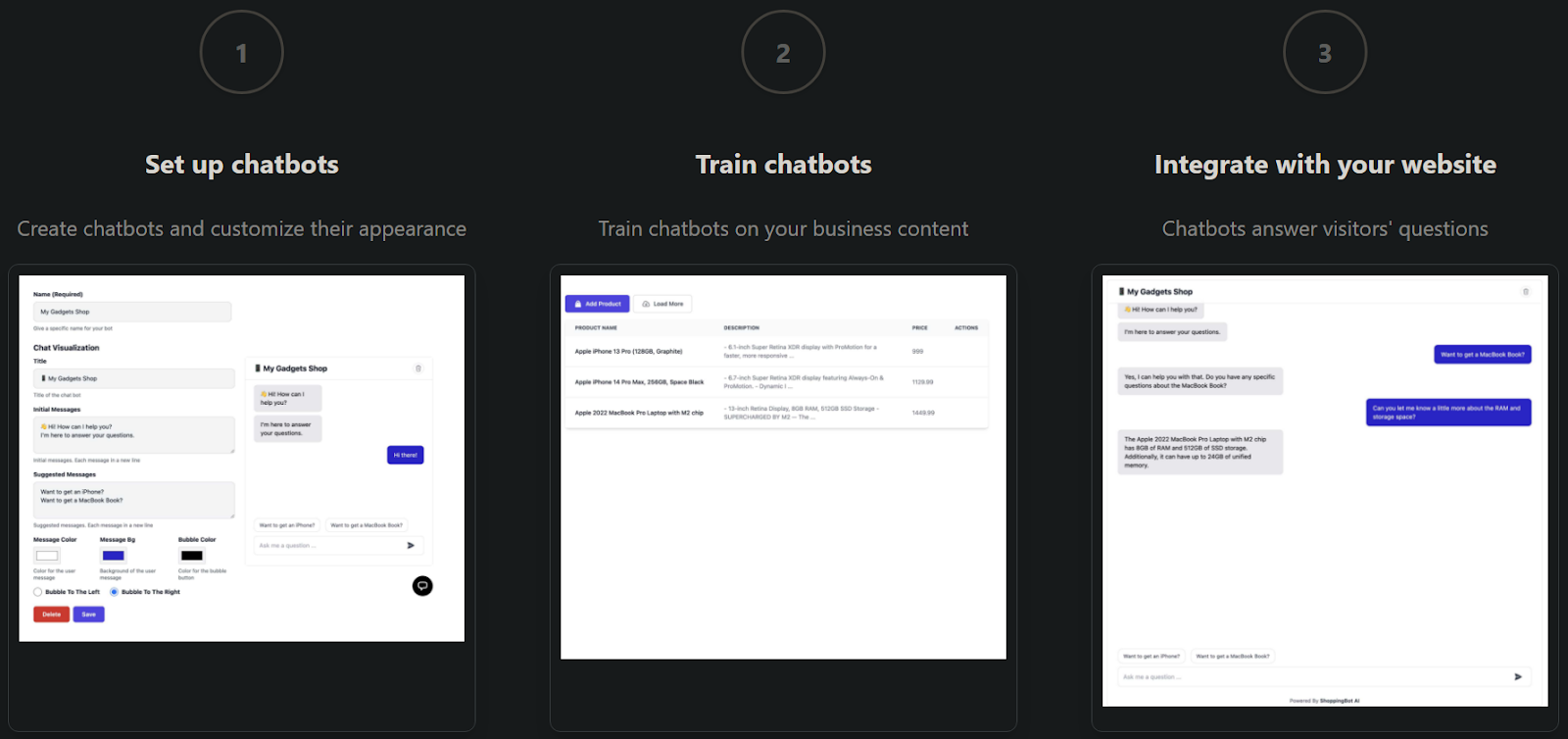
Easy to set up with email support for all users.
Ability to respond to customer queries within 48 business hours.
Strong security mechanisms with firewalls and encryptions to keep all of your data confidential.
Multilingual support is beneficial for eCommerce businesses operating out of multiple countries.
Features
- Personalized recommendations
- Secure conversations
- Product discovery
- Natural language processing
- Image classification
- Multilingual support
4. Shopmate
Shopmate is an AI chatbot that boasts 24/7 customer support, but it only needs 3 minutes to know your products and store information.
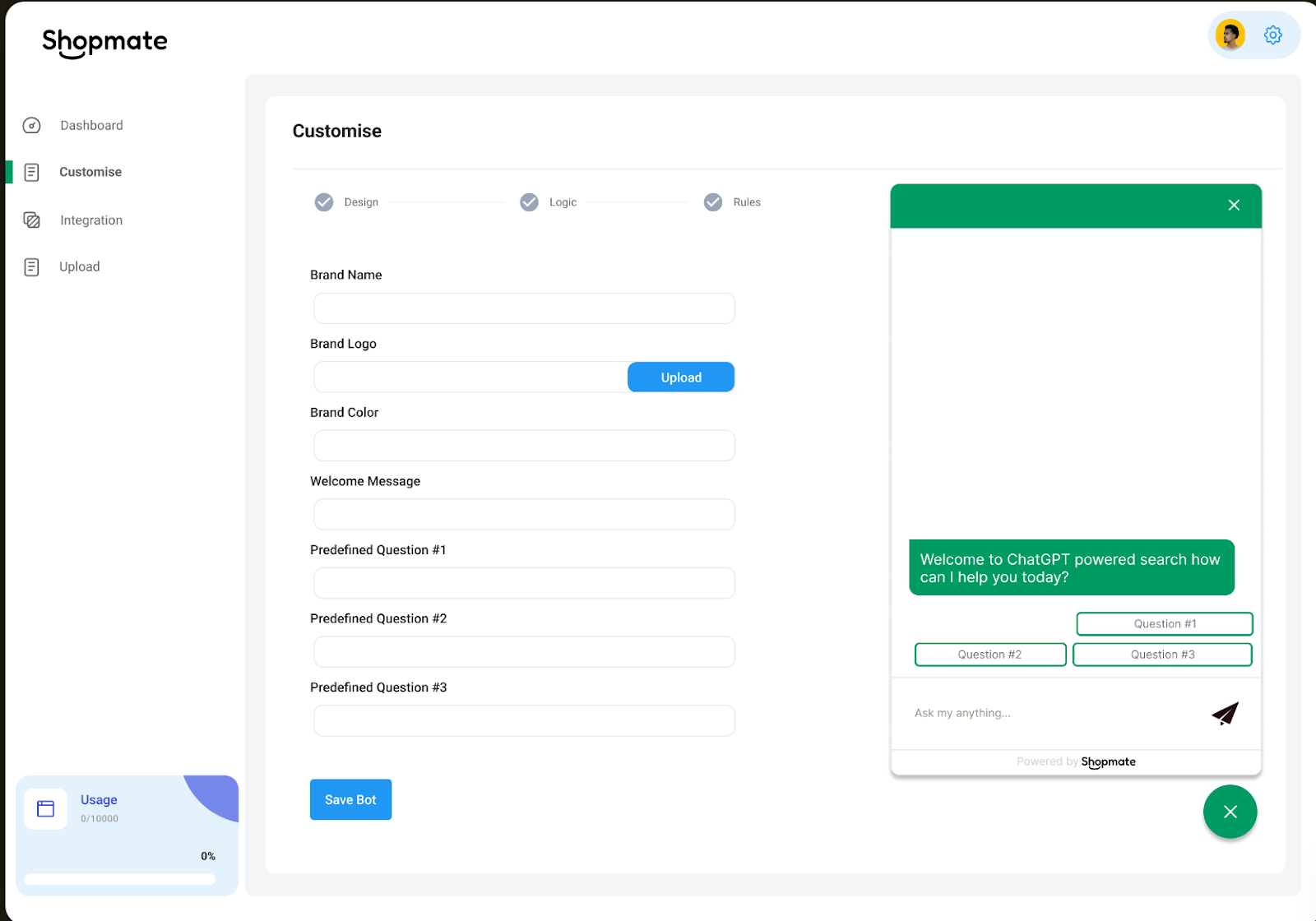
It analyzes your customers’ shopping history and preferences to intelligently recommend the right products.
Support handling feature allows you to answer customer queries instantly and efficiently.
Automatically analyze information from blogs, internal documentation, and FAQs on your site. This allows the AI shopping assistant to provide customers with accurate information.
Features
- Fast processing speeds
- 24/7 availability
- Personalized recommendations
- Secure conversations
- Product discovery
5. Intercom AI Chatbot
Intercom AI chatbot is focused on improving team efficiency and resolving customers’ concerns. The chatbot resolves 50% of support questions on its own, within an instant.
The chatbot named Fin is the result of a big breakthrough by Intercom in the field of sophisticated AI language models.

It provides accurate answers and maintains a conversational tone to make your customers feel at home.
Built-in safeguard to ensure that Fin only answers customer queries based on your brand’s guidelines.
It’s an AI tool you can trust with your brand’s secrets as your team can also monitor all of the bot’s responses.
Features
- Natural language processing
- Accurate product discovery
- Personalized recommendations
- Secure conversations
6. Infichat
Infichat is an AI-powered shopping chatbot that assists your customers in product searches. Customers can ask questions based on the descriptions, sizes, and colors of the product.
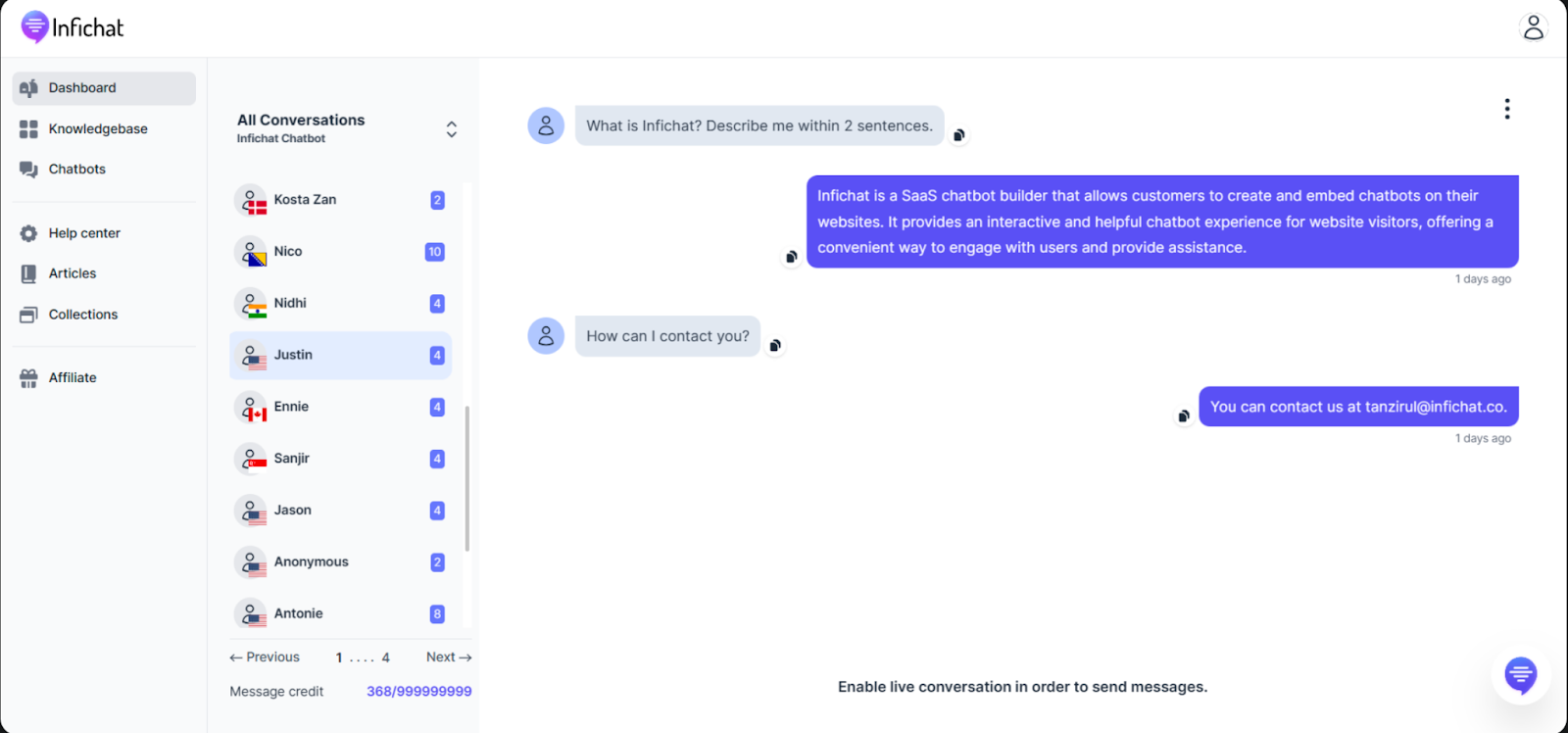
Personalized recommendations based on their shopping history.
24/7 availability makes it one of the best tools to enhance customer satisfaction and boost sales.
Minimal setup required. The AI tool is easy to use for any of your team members.
Features
- Seamless customer support
- Instant product discovery
- Personalized recommendations
- 24/7 availability
7. Tidio AI
Tidio AI, a user-friendly and functional live chat app comes with the best customer support out there. The chatbot and ticketing solution is purpose-built to serve mid-sized eCommerce businesses that wish to solve customer problems and improve sales.
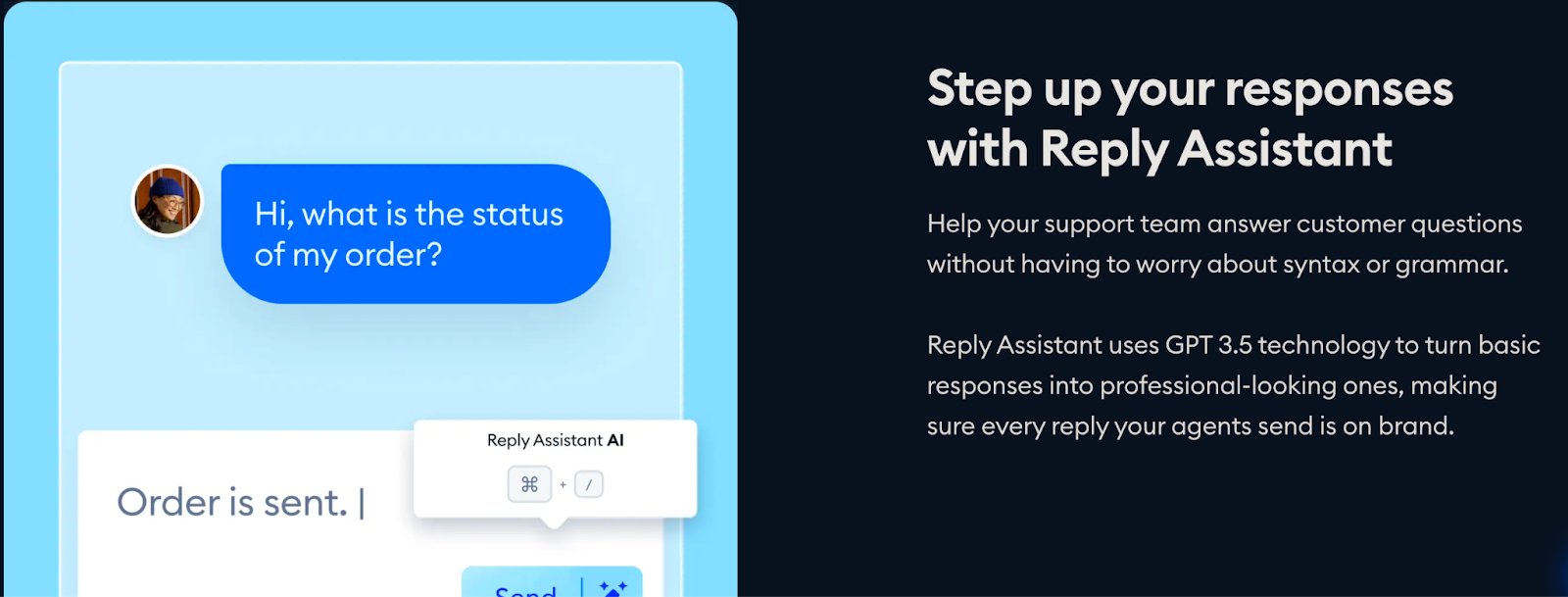
Customization based on your brand requirements.
Easy setup with extensive chatbot template library. These templates cover both sales and support scenarios, meaning your eCommerce brand doesn’t have to worry about responding to longer conversations.
The advanced AI behind Tidio is capable of holding long conversations with customers in case of highly-priced items.
Features
- Customization
- Built-in templates
- Seamless customer support
- Instant product discovery
8. Chatfuel
Chatfuel takes the convenience of setting up an AI chatbot to the next level. You don’t need any special skills in coding or programming languages. All you need to do is click a few buttons to select what you like the most.

Drag-and-drop builder for creating your customized chatbots.
Ready-to-use templates and free catalog for popular eCommerce platforms.
Easy to use with an organized UI which makes the work all the more productive.
Integrates with external systems to enhance automation and performance.
Features
- Drag-and-drop functionality
- Easy to use
- Customization
- Ready-to-use templates
- Free catalog
9. Verloop
Verloop enhances your customer support by responding to customers in the way they like. This includes voice conversations, WhatsApp, Instagram, and web applications just to name a few.
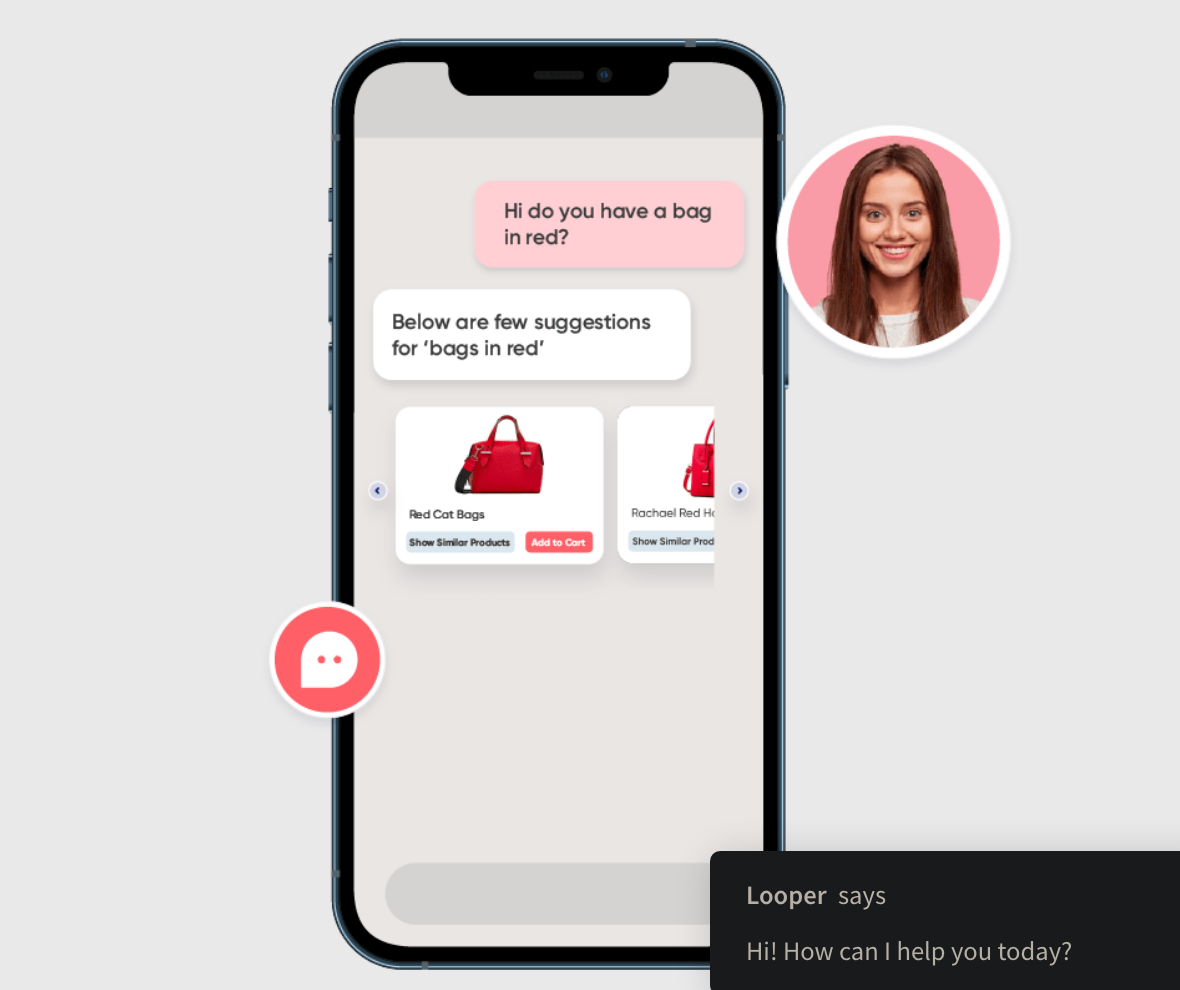
It is user-friendly and allows you to carry on conversations with up to 3 customers at the same time.
Your team can address more customer queries in less time.
You need fewer customer support executives to pay salaries to.
Features
- Customized bot solutions
- Personalized conversations
- One-to-many conversations
- Instant product discovery
- 24/7 availability
10. Giosg
Giosg is a sales acceleration solution that automates live chat using AI chatbots. Its interactive content helps build engaging online experiences for your shoppers and turns them into loyal customers.

Easy navigation and built-in tools for marketing, communication, and handling support tickets.
Interaction builder allows you to create elements and interactions with customers on your website when required.
Features
- Seamless customer support
- Easy navigation
- Interaction builder
- 24/7 availability
Key Takeaways
As technology evolves, eCommerce businesses are looking to speed up their operations. AI shopping assistants are quickly gaining popularity in the industry. Both businesses and customers benefit from personalized product suggestions and accurate search results.
If you’re looking to build brand loyalty through AI-based personalized recommendations, look no further. shopdev’s AI shopping assistant has everything you need to take your brand’s customer experience to the next level.

9 Generative AI Use Cases for Retail Success in 2024
Exceptional customer experience and loyalty are the keys to running a successful retail business in 2024. With thousands of brands to choose from, customers tend to fall for the ones that market their products with high-quality personalized content and offer the best customer service.
Thankfully, the retail industry now has a solution in the form of generative AI, which allows them to enhance their services while meeting their growth targets. According to McKinsey, generative AI can boost productivity in the retail sector by around 1-2% of global revenues, which is estimated to fall between $400B - $660B per year.
Read on to learn more about the applications of generative AI in retail.
Significance of Staying Updated with AI Trends
ChatGPT, Bard, Copy.AI, and DALL-E have quickly become buzzwords as businesses have begun to realize their potential in improving operational efficiency. But what if your business never knew about generative AI?
That’s right - success in the retail landscape is synonymous with staying updated. In order to stay one step ahead of your competition, you need to be aware of the latest trends in AI and keep an eye out for solutions that can improve your workflow.
Your customers are not willing to wait for webpages to load and carry out extensive searches to find the right product. Instead, they expect to see relevant content right from the moment they land on your brand website. In fact, 73% of customers expect your brand to know their preferences.
It's no surprise that 82% of organizations are currently using or considering generative AI as the technology that will transform their industry. It allows you to automate repetitive tasks and unlocks new business opportunities.
Generative AI Retail Use Cases
The use cases of generative AI in retail go far beyond enhancing customer experience and creating unique content. It provides business owners with valuable insights to make informed decisions while providing creative assistance in the form of unique texts, graphics, audio, and video.
The following are the most notable generative AI use cases for retail:
Personalized Product Recommendations
71% of customers want retailers to show personalized product recommendations, and 76% are frustrated when this is not the case. Generative AI allows you to analyze large amounts of customer data such as shopping history, items added to a cart, searches, and demographics.
This level of customer behavior analysis means that you can understand your buyers' personal preferences and likings. As a result, your product recommendations are not only more personalized, meaning you have much better chances of improving customer engagement.
The best example of the application of generative AI to create personalized recommendations can be seen in none other than Amazon. The retail giant uses generative AI to analyze customers’ past purchases and searches to offer highly personalized product recommendations. As a result, the shopping experience is enhanced and customers see products that are relevant to their interests.

That being said, offering such recommendations is not possible without specialized software working its magic in the backend. For instance, shopdev’s very own Recommendation Engine, which is part of its next-generation operating system XStak, provides accurate and personalized suggestions to improve customer engagement and increase AOV in leading retail brands.
Virtual Try-Ons and Fittings
One of the problems customers face while shopping for clothes and other wearables online is knowing whether the size will fit perfectly. Now, retailers can offer customers immersive and interactive shopping experiences through generative models and computer vision. With generative AI, you can use conversational virtual assistants that help customers through their online shopping journeys.
Virtual try-ons and fittings with generative AI allow customers to see how the apparel and accessories, or even furniture items they buy online will fit them and their spaces. This reduces the hesitation that customers feel while shopping for wearables online and also eliminates the need to visit brick-and-mortar stores for try-ons. In this way, the use of generative AI in virtual try-ons reduces product return rates and improves customer satisfaction rates in retail.
Zolando is one of the leading fashion retail brands that has introduced a virtual try-on room for online shoppers.

Using machine learning models, computer vision, and other AI tools, the brand’s fitting room predicts the right sizes for customers. Although the virtual try-on model is still in its infancy, more than 30,000 customers have already tried it.
Dynamic Pricing Optimization
Dynamic pricing allows retailers to get a competitive advantage and target the right customers. Both price elevations and discounts account for a higher number of sales when done smartly. Speaking of smart solutions, you don’t need to look further than generative AI to get your prices right. Generative AI factors in customer data, demand, competitor pricing, and ongoing trends to optimize prices in real time.
Not only that, but retailers are also using generative AI to create personalized discounts based on customer data analysis. This helps curate custom shopping journeys and provide customers with relevant content, ultimately helping retailers boost sales and loyalty.
One of the best examples of dynamic pricing in retail is seen in Walmart Marketplace. The renowned retailer allows sellers to adjust their prices in real-time to stay competitive and boost their profits. This is made possible by a generative AI-based Repricer tool that allows third-party sellers to take control of their own dynamic pricing strategies. These strategies consider Walmart.com prices and the prices of the given products on other eCommerce sites to set up the right prices.
AI-Powered Visual Search
Visual search is a useful feature in retail that allows customers to find the right products using images uploaded to engines like Google Lens and Pinterest Lens. Generative AI plays a major role in making visual search possible, as it analyzes and extracts important features from images to help find similar products.
When customers upload images of products they want to find, the generative AI system picks particular features from the image to enhance product discovery and shows similar products available on the market. This significantly improves the shopping experience as customers do not have to try entering different product names to find what they need.
For example, Forever 21 has adopted the visual search feature to offer better shopping experiences to its customers. The brand is an advocate for the visual way of going about product searches and purchases. It aims to use visual product discovery with AI to make online shopping more convenient.

If you are thinking about incorporating a visual search feature in your retail brand, look no further. Our expert software engineers at shopdev have developed and rolled out an Image Similarity module as part of our retail operating system known as XStak. The system is helping retailers improve their brand image by enabling customers to easily find their desired products. Shoppers get instant access to product details and can make their purchases confidently.
Automated Customer Service and Chatbots
Providing customers with fast responses is key to improving satisfaction rates and gaining loyalty. Fortunately for retail businesses, generative AI can help automate customer services with the help of intelligent chatbots. AI can provide answers to customer queries based on their history and demographic information.
It also provides personalized support and recommendations with the help of conversational interfaces. In this use case, generative AI makes use of natural language processing and large language models (LLMs) to resolve customer queries as fast as possible. This helps create a flawless shopping experience and allows retailers to boost the efficiency of their customer support processes.
Retail brand American Eagle gives us an example of AI being put to use in customer support. The brand has demonstrated customer service innovation by leveraging AI to transform its in-store dressing rooms. By using computer vision and machine learning to analyze a customer’s clothing preferences, size, and skin tone, American Eagle offers them the most suitable products that are likely to fit well.

With the help of AI, the brand has significantly enhanced the shopping experience and made it highly personalized. As a result, retail customers get served in the best way possible using the best-in-breed technology.
Inventory Management and Demand Forecasting
Supply chain and shipping issues are the constant companions of every retail business. As these issues became common during the pandemic, more and more retailers have now adopted automated inventory management and demand forecasting systems. Here, generative AI helps retailers analyze sales data and manage their inventory effectively.
It forecasts trends by processing and analyzing historical data, customer demands, and competitor data to make better decisions while ordering inventory items. This helps prevent over-ordering, stockouts, and dead inventory - hence optimizing your supply chain and delivery processes.
H&M, a leading retail fashion brand, has implemented AI to improve inventory management. The AI algorithms capture data from search engines and blogs to learn about the latest fashion trends. This data clarifies how much customers are paying, what they are buying, and what kind of shopping channels they are using. This helps H&M make informed decisions about restocking popular items and smartly distributing them throughout their franchises.
Customer Sentiment Analysis
Knowing what your customers think about your brand and your products is crucial to improving sales. Sentiment analysis is one of the tactics that allows retailers to get a better understanding of how customers feel about their products. While the most basic way of performing sentiment analysis is to analyze online reviews, generative AI takes it to another level.
You can now analyze any kind of text with generative AI to understand whether your customers are demonstrating positive, negative, or neutral sentiments for your products. Furthermore, AI algorithms are now advanced enough to understand new texts apart from the data they are trained on.
As an example of a retail brand using AI for customer sentiment analysis, we look back at the biggest online retailer of them all - Amazon. The platform’s AI tool Amazon Comprehend analyzes customer sentiments from product reviews and categorizes them based on positive, negative, and neutral sentiments.
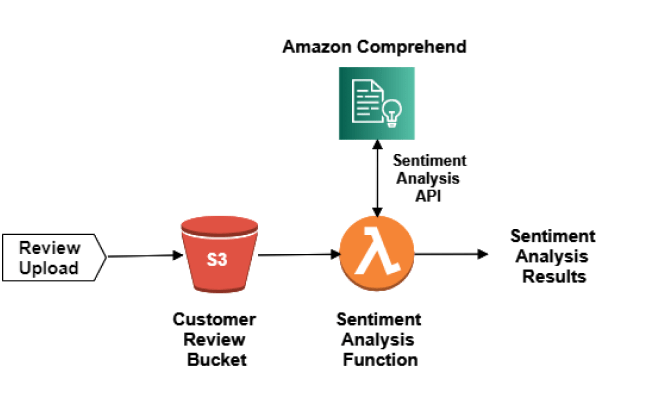
This helps Amazon identify loopholes and work on improving the products and services that generate negative sentiments. By better understanding what customers expect and want, the retail giant continues to improve its service quality.
Fraud Detection and Prevention
Last but not least, generative AI also finds a useful application in fraud detection and prevention. The retail sector is quite used to concerns of fake purchases and returns in fraudulent efforts to gain easy money. In such scenarios, generative AI algorithms can save retailers a lot of money by detecting fraudulent transactions.
Not only does AI prevent fraud from the customer end, but also identifies counterfeit products from unauthorized sellers in online marketplaces. The algorithms can pinpoint deviations from normal behavior in transactions and inconsistencies in product descriptions, hence helping prevent fraud.
Walmart demonstrates an example of AI being used for fraud prevention in retail. The retail chain has filed a patent for a machine learning system that can detect fraudulent transactions. The AI-based system is trained on past payment transfer data to detect deviations in payment patterns. It is capable of detecting a fraudulent payment transfer the moment it is initiated or received by a user.
AI Adoption and Integration Challenges For Retailers
Although generative AI is gaining popularity at a fast pace, many businesses are still facing challenges in utilizing its full potential. For instance, many startups and mid-sized retail businesses do not have the understanding and expertise required to implement AI in their systems.
Bias and Poor Quality Data
As mentioned earlier, generative AI models need to be trained on extensive, high-quality data to be able to produce accurate results. This is a challenge for retailers as they cannot guarantee that the data used to train the AI models will not be biased, unethical, or of poor quality.
Complexity of AI Models
Even when you think you can gather the right data, there is the next challenge of understanding and interpreting the generative AI model. Only AI experts can understand why a model makes a particular decision in a given scenario. For retailers, the decisions or outputs are often unexpected, making them question the reliability of AI tools.
That being said, making your mark in the competitive retail environment does require high brand visibility and exceptional customer service. In order to ensure that your brand stays on top, you need to consider these integration challenges as stepping stones towards business growth. After all, the result of successfully incorporating generative AI into your business will be a significant competitive advantage. And in retail, that is all you need.
Key Takeaways
Establishing a retail brand in 2024 requires a deep understanding of customer preferences and competitor strategies. By using generative AI, you can stay ahead of the competition and come up with not one but multiple strategies to pull more and more customers. As AI tools accelerate your business operations, you can offer your customers smooth shopping experiences that make them come back for more.
Book your free 40-minute
consultation with us.
Let's have a call and discuss your product.





























































%202.avif)














